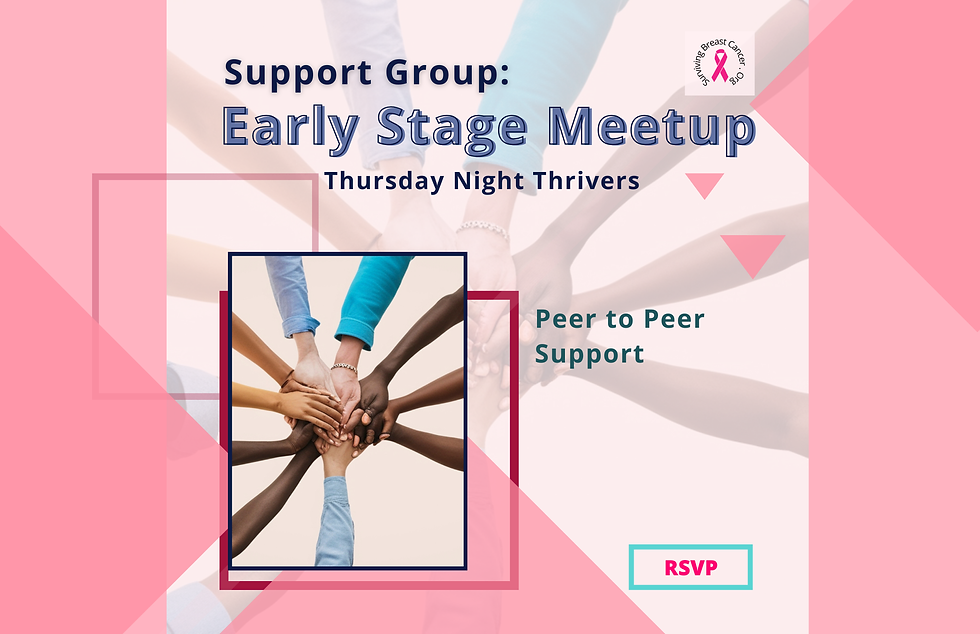Breast Cancer and The Transgender Community
- Surviving Breast Cancer

- Aug 7, 2022
- 4 min read
Updated: Oct 27, 2025

As we continue to celebrate LGBTQIA+ Pride Month, this week, we are featuring several articles and stories about transgender people who are diagnosed with breast cancer. While breast cancer is much more prevalent in those assigned female at birth, it can be found in all genders, including both transgender men and women.
Below, we bring you stories of transgender people who are breast cancer survivors. These thrivers share their experiences and struggles with the life-changing news of a breast cancer diagnosis, in navigating the stigmas and misconceptions within the medical field, and in their relationships with supportive, understanding physicians and oncologists. These incredible humans are helping to advocate and educate others in their community so that future thrivers may have more supportive experiences. We also share research on the risks of cancer among transgender individuals and the LGBTQIA+ community at large.
As always, let us know your thoughts and how you’d like to contribute to the discussion.
Eli Oberman was 27 when he was diagnosed with breast cancer. Eight years earlier, he started taking testosterone for its masculinizing effects, but never opted for "top surgery" (breast reduction). Facing a double mastectomy to treat his aggressive cancer, he felt conflicted about receiving the surgery. “I felt guilty, able to get free surgery I didn’t want because I had cancer, and so many others want it and can’t get it,” he said. In this article from the New York Times, he goes on to discuss the challenges, stigma, and discrimination he and other transgender friends have faced in the healthcare system.
Eli's physician, Dr. Asa Radix, at the Callen-Lorde Community Health Center in New York, is empathetic and understanding of the barriers that transgender patients face and why they may try to avoid the healthcare system altogether. Still, Oberman noted that he did not join breast cancer support groups for fear of not being accepted.
Hopefully, by discussing these challenges more openly, we can create a more accepting community for other thrivers like Eli. Read More.
Whether to undergo gender-affirming hormone replacement therapy (HRT) is a very personal decision for transgender individuals. There are a number of factors to discuss with one's physician before starting treatment, including a slightly higher risk of breast cancer.
A 2019 Dutch study found that transgender women (people assigned male at birth, identifying as female) using hormone treatment have a higher rate of breast cancer than cisgender males (assigned male at birth, identifying as male). This finding is similar to previous studies that have found increased risk of breast cancer in postmenopausal women using HRT.
However, the risk for transgender women is still lower than that of the general female population. Furthermore, since the risk of breast cancer in cisgender men is very low to begin with, even with this increased risk, the absolute risk to transgender women still remains low.
Like cisgender women (assigned female at birth), transgender individuals should remain aware of the signs and symptoms of breast cancer and talk to their doctor if they have any concerns. Read More.
A 2020 report estimates that 62,530 of the nearly 17 million cancer survivors in the United States are transgender. The researchers used 2014–2018 data from the Behavioral Risk Factor Surveillance System for the 37 states and one territory (Guam) in the United States, based on gender identity questions on their surveys. The study found that transgender men were twice as likely as cisgender men to have gotten a cancer diagnosis. However, gender nonconforming individuals and transgender women did not have a rate of cancer prevalence that was significantly different from that of cisgender men and cisgender women.
While the actual rates of cancer diagnosis among transgender women are similar to those of the general population, the researchers found that transgender and non-binary people were less likely to have health insurance and were more likely to be low-income and have unmet medical needs because of the cost of care.
These findings are important to health outcomes for those diagnosed. “We hope these findings are a wake-up call for health-care providers that transgender cancer survivors have complex medical needs,” said study lead author Ulrike Boehmer, PhD, Associate Professor of Community Health Sciences at Boston University School of Public Health (BUSPH). Read More.
After finding a lump in her breast that would not go away, Beverly Lipscomb learned she had triple-negative breast cancer, a rare and aggressive form of cancer. As part of her cancer treatment, Beverly's doctors recommended that she stop taking her gender-affirming hormones. Having taken these hormones since she was a teen, Beverly was worried about how discontinuing their use would change her body. "Luckily for Lipscomb, the staff worked with her to make sure she felt comfortable with all the decisions, including stopping her hormones.
Dr. Joshua Safer, Executive Director of the Mount Sinai Center for Transgender Medicine and Surgery, said it’s essential that transgender patients receive respectful treatment. Many transgender patients put off seeing a doctor because of worries about being misgendered or not being taken seriously. Dr. Safer said that it is important to create a medical environment that is friendlier to transgender people because the earlier that breast cancer is detected, the better the chance of saving the patient's life.
Thankfully for Lipscomb, her fears were not confirmed: “Here I am, I’m Black. I’m trans and I’m going to this hospital to be taken care of, I said, ‘How are they going to receive me?’” she said. “But nothing. No kind of racism. No anti-trans anything. I was really worried. I had already built up a wall of defense.”
Now, she has finished radiation and is encouraging other trans women to seek care as needed. Read More.














